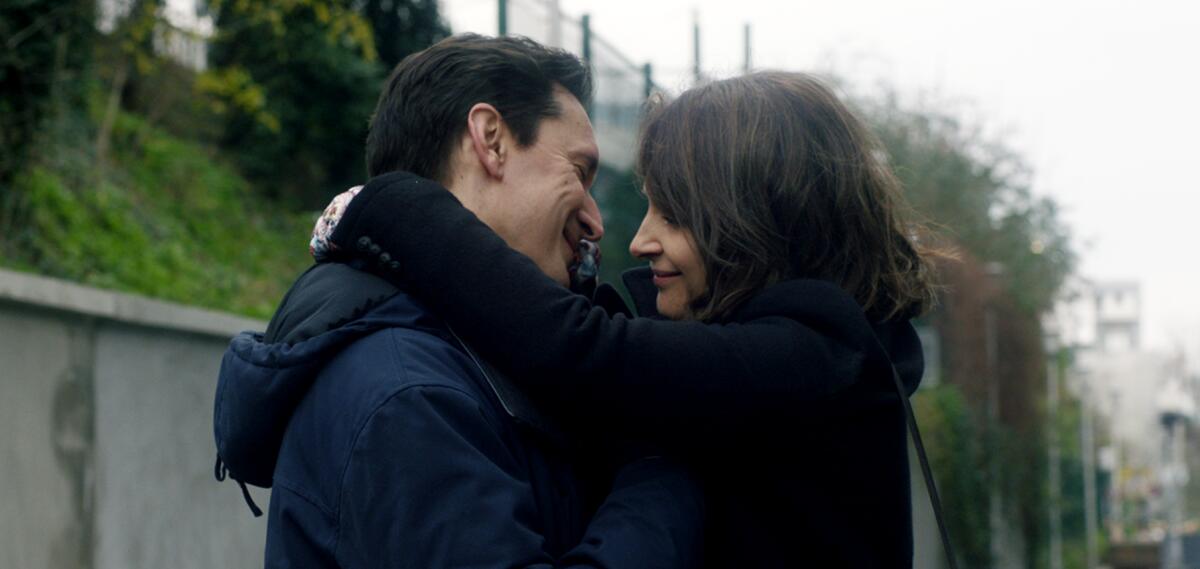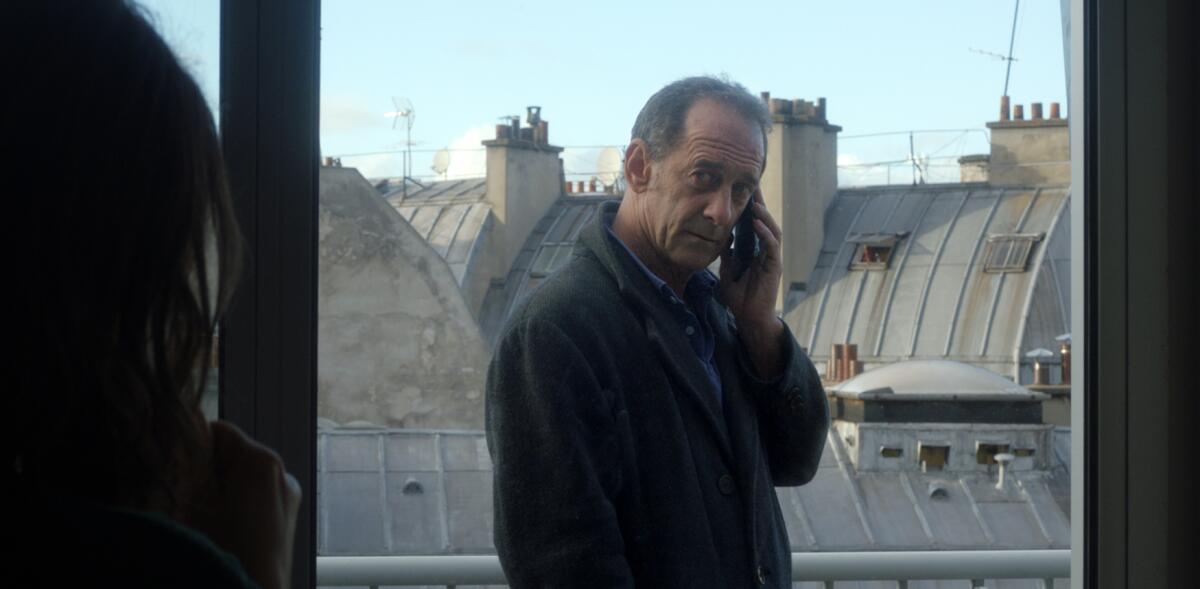Thorny and unabashedly sexy, Claire Denis’ ‘Both Sides of the Blade’ cuts deep

- Share via
For much of Claire Denis’ slow-roiling, superbly acted melodrama “Both Sides of the Blade,” we are in a Paris apartment that feels like a private paradise, a haven of domestic tranquility and sexual fulfillment. Sara (Juliette Binoche) and Jean (Vincent Lindon) have been together for a decade and still can’t keep their hands off each other, starting with an early beachside getaway and continuing well after they’ve returned home. There are kitchen caresses, bedroom smiles and long embraces on their balcony overlooking the city below, whose everyday anxieties — the story takes place smack in the middle of the COVID-19 pandemic — seem to exist at a merciful remove.
Sara and Jean’s erotic bliss is so overpowering — and such a forceful reminder of how sexless so many of our movies are by comparison — that it feels a little too good to be true. That seems even more the case sometime later, when their apartment has become an emotional battleground, and Denis, a master of form, practically reshapes the walls around them in response. (Her key collaborators here include director of photography Eric Gautier and editors Emmanuelle Pencalet, Sandie Bompar and Guy Lecorne.) The air is charged with suspicion; that lovely balcony is sealed off. The camera darts between the lovers’ angry, exhausted faces in a flurry of slamming edits and chin-severing closeups, as if to literalize the idea that something between them has broken.
For your safety
The Times is committed to reviewing theatrical film releases during the COVID-19 pandemic. Because moviegoing carries risks during this time, we remind readers to follow health and safety guidelines as outlined by the CDC and local health officials.
Until this point, their relationship has felt like a near-perfect bond forged in the face of imperfect circumstances. Years earlier, Jean spent time in prison for an unspecified crime, and he’s had trouble finding steady work since. His incarceration also kept him away from Marcus (Issa Perica), his biracial son from an earlier marriage, who’s now 15 and lives in the suburbs with Jean’s mother, Nelly (the superb screen veteran Bulle Ogier).
But for the most part, Sara and Jean manage to live free from the disappointments of the past, at least until the past comes looking for them. It returns in the form of a wealthy entrepreneur, François (a suave Grégoire Colin), who used to be Jean’s colleague and Sara’s lover, and who seems quietly keen to revive both of those roles. François’ intentions will be obvious enough to the audience, even as Sara and Jean try to persuade themselves that their arrangement — Jean will scout rugby players for François’ sports talent agency — is strictly a professional one. Jean can hardly refuse the work. Sara, for her part, offers what she thinks are reassurances (“I live with you, Jean, no need to worry”) and succeeds only in raising red flags.
You can probably guess much of the rest. Sara and François meet again, and long-suppressed memories and desires come surging back. Caught between desire and denial, Sara becomes the hypotenuse of a full-blown romantic triangle. She doesn’t succumb immediately. Denis, adapting a novel by Christine Angot (who also co-wrote the script), gives the buildup an excruciating tension, trapping Sara in a quandary best summed up by the title. (Speaking of indecision: At one point, “Both Sides of the Blade” was set to be released under a different English-language title, “Fire.” Its original French title, “Avec Amour et Acharnement,” translates as “With Love and Relentlessness.”)

All this may sound like unusually straightforward, soapy material for Denis, a filmmaker known for her jagged, elliptical narratives and confrontational subject matter. Yet while “Both Sides of the Blade” may unfold in more linear fashion than, say, her brutally transgressive sex-in-space odyssey, “High Life,” it is nonetheless born of the same searching, exploratory spirit. Watching it, you can feel Denis zeroing in on the conventions of the bourgeois French melodrama with something resembling a lover’s playfulness; she wants to rough them up, test their limits and bend them into challenging new configurations. (Her work here earned her the directing prize at this year’s Berlin International Film Festival.)
There’s a crucial moment, mid-quarrel, when Jean fumes about having seen François kiss Sara on the lips. Sara insists, defensively, that she pulled away: “You saw a fragment of a movement,” she claims, an oddly fitting choice of words. A Denis movie can feel like a symphony of such fragments, and in “Both Sides of the Blade,” the director continually isolates these gestures — a hand reaching across a mattress, a gaze almost but not quite connecting with another — as if she were trying to deconstruct, but also maximize, their emotional power. In one achingly tender scene, Sara embraces Jean during a moment of sorrow, and her words (“Mon amour, tu es mon amour”) become almost as musical a refrain as the haunting orchestrations of Denis’ regular composers, the British band Tindersticks.
Your emotions are stirred, but also perhaps your doubts. Is there anything real or concrete behind these whispered endearments, these blatant displays of affection, this slathered-on score? Sara’s shifting allegiances and increasingly volatile desires in the story’s second half suggest a complicated answer. Like a less funny version of Isabelle, the middle-aged single woman Binoche played in Denis’ 2018 comedy, “Let the Sunshine In,” she is an avatar of romantic uncertainty. And her coherence as a character is no small testament to Binoche, who once again inhabits emotions so extreme and contradictory as to be rendered nonsensical in the hands of a lesser performer.

Lindon, coming off his astonishing work in last year’s “Titane,” proves his co-star’s equal in an entirely different register. Jean is the opposite of mercurial, and his handsome, weathered face is an open book or perhaps an open wound; you see his stubborn pride, but also the chastened humility of someone who knows what it means to lose everything and now clings desperately to what he still has. You may also see glimpses of the sexy stranger Lindon played with such effortless masculine cool in “Friday Night,” one of several Denis films evoked here by her rotating company of actors. (Besides Binoche, Lindon and Colin, the director’s past collaborators here include Mati Diop and Lola Créton, who both pop up in brief roles.)
There’s a touch of auteurist indulgence in these choices, and also in some of the subplots that Denis cultivates, to ungainly but stimulating effect, at the edges of the story. Sara, a radio talk-show host, often interviews writers and artists about racial and political issues (Frantz Fanon is invoked) that don’t seem to engage her much outside her recording studio. Questions of justice and inequality intrude more pointedly in Jean’s conversations with Marcus, who’s getting into trouble at school and trying to figure out his future. In these scenes, we see a father’s attempt, clumsily yet movingly, to liberate his son from an overly determinist view of race and class. We also sense Denis’ engagement with a larger question of freedom, a concept that means different things to a Black teenager, a white woman and an ex-con.
Is Denis productively complicating our understanding of her two leads, or implicitly attacking the narcissism and privilege of their struggle, and perhaps even of the emotionally extravagant genre to which they belong? I think she’s simply refusing to draw easy narrative boundaries between Sara and Jean’s private lives and the larger world in which they’re situated. As we’re reminded by the sight of characters repeatedly donning face masks, that world doesn’t recede politely into the background, even when inconvenient desires intrude and a home starts to feel like uncharted territory. Maybe life is a melodrama, this movie suggests. Or maybe melodrama is closer to life than we realize.
'Both Sides of the Blade'
(In French with English subtitles)
Not rated
Running time: 1 hour, 56 minutes
Playing: Starts July 8 at Laemmle Royal, West Los Angeles
More to Read
Only good movies
Get the Indie Focus newsletter, Mark Olsen's weekly guide to the world of cinema.
You may occasionally receive promotional content from the Los Angeles Times.









